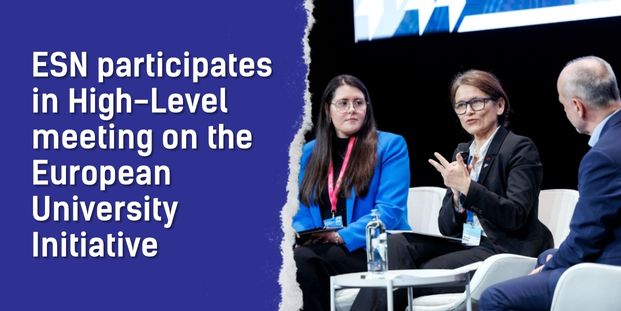
On 26th and 27th February 2025, the European Commission hosted a high-level meeting in Brussels, bringing together key stakeholders to discuss the progress and future of the European Universities initiative. This significant event gathered representatives from all 65 European Universities alliances, key higher education organisations such as European Parliament members, national and regional authorities, and student organisations.
The event saw the participation of ESN as a panellist on the transformation of European Universities across all their core missions: education, research, and innovation. Reinforcing our commitment to advocating for student needs, fostering collaboration between institutions, and contributing to the evolution of the European Universities initiative.
A milestone for European Higher Education
The meeting provided an opportunity to reflect on the achievements of the European Universities initiative over the past five years while addressing the challenges faced by the Alliances. Discussions focused on strategies to enhance collaboration among European Universities to actively contribute to Europe’s progress, resilience, and social fairness.
The event started on 26th February with an address by Roxana Mînzatu, Commission Executive Vice-President for Social Rights and Skills, Quality Jobs and Preparedness. A closed-door meeting for rectors of European Universities followed, providing a space for dialogue on how alliances can drive transformation in higher education, support innovation, and enhance Europe’s competitiveness. The evening featured high-level discussions between rectors, setting the stage for the following day's sessions.
Key contributions from the Erasmus Student Network
ESN underscored the importance of student mobility, engagement, and inclusion in shaping the future of European higher education. The network highlighted how fostering cooperation between innovation ecosystems, strengthening Europe’s regions, and promoting student exchanges can further enhance the impact of the European Universities initiative.
The discussions also addressed the persistent skills shortages in Europe, spanning both high- and low-skilled sectors, which present direct obstacles to investment and innovation. Mobility programmes, such as Erasmus+, are uniquely positioned to tackle these deficits by equipping participants with transnational experiences, adaptability, and critical competencies aligned with emerging economic priorities.
Beyond mobility, barriers to the free flow of research and innovation also hinder economic growth and industrial competitiveness. Former Italian Prime Minister Enrico Letta emphasised that Europe’s difficulty in translating its research capacity into globally competitive industries stems from fragmented ecosystems that fail to integrate education, research, and industry effectively. Mobility programmes play a crucial role in bridging these gaps by facilitating cross-border collaboration, enabling the dissemination of innovative ideas, and fostering networks that strengthen the EU’s collective capacity for innovation.
Finally, ESN emphasised the need to increase student involvement in decision-making processes, ensuring that European Universities remain student-centred and accessible to all. ESN’s participation in this event reinforced the necessity of integrating the student voice into the ongoing development of European higher education policies, ensuring that future initiatives truly reflect the needs and aspirations of students across Europe.

Follow ESN